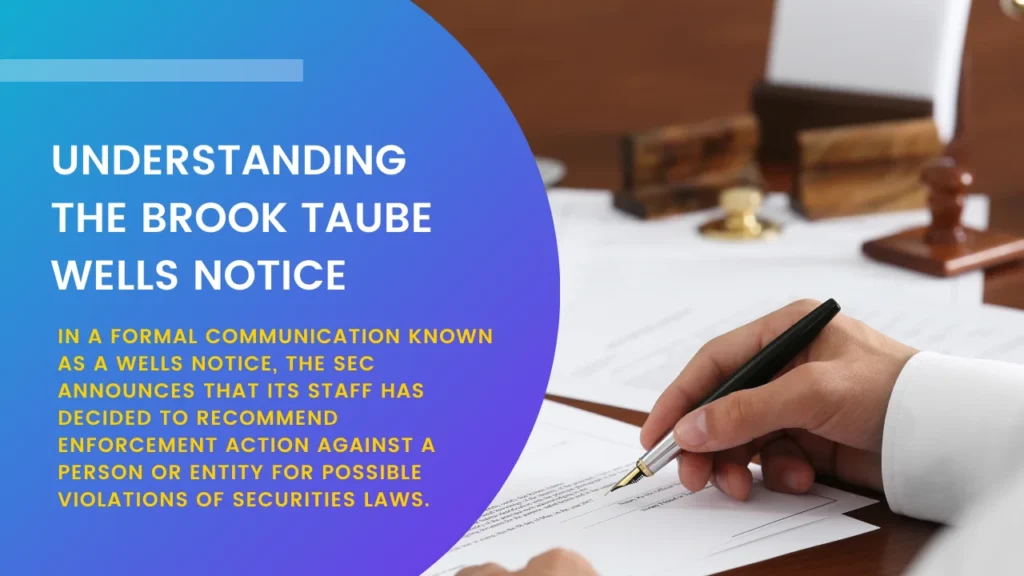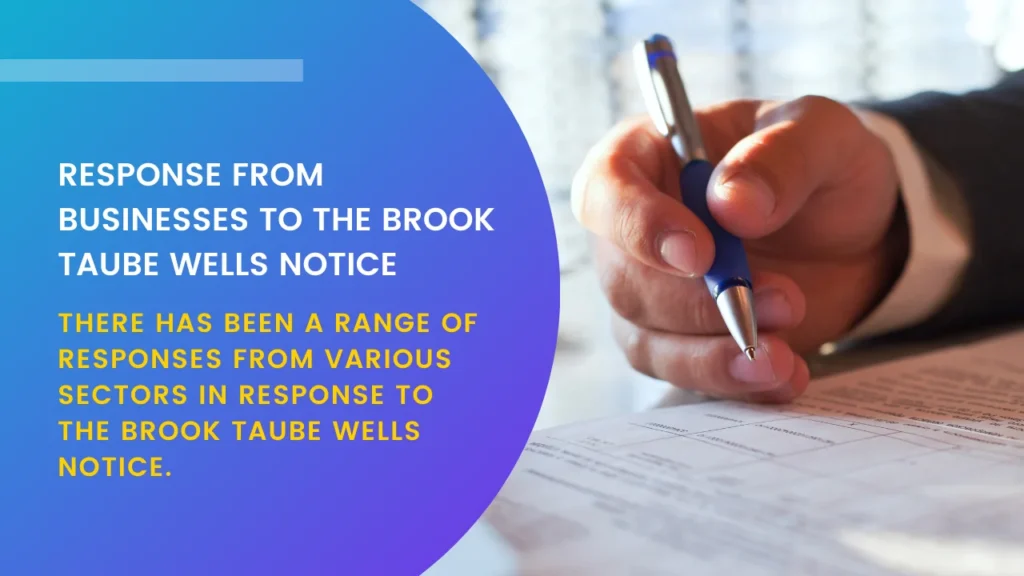Introduction
The financial industry heavyweight and co-founder of Medley Management Inc., Brook Taube, has lately been the subject of regulatory investigation after the SEC issued the Brook Taube Wells Notice. This notification signifies the SEC’s initial decision to suggest that Taube be subject to enforcement action due to possible breaches of federal securities laws. Allegations of misleading statements made to investors and clients have a significant impact on the firm’s perceived stability and growth, which is why the SEC is investigating Taube and Medley Management. Seth B. Taube, Brook’s brother and fellow co-founder of Medley Management, has also been under scrutiny, adding to the complexities of the investigation and raising further questions about the firm’s internal governance and practices.
Who is Brook Taube and What is Medley Management?
Medley Management Inc., co-founded by the renowned financier Brook B. Taube, provides institutional and retail investors with credit-related investment solutions. Due to his extensive background in finance, Taube has been instrumental in developing Medley’s strategies and contributing to the company’s success. Nevertheless, the firm and his career, including the involvement of Seth Taube Medley, have been under intense scrutiny due to recent developments.
Taube oversaw a string of mergers and acquisitions that allowed Medley Management to broaden its scope and increase the value of the assets it managed. Despite its best intentions, the company’s methods have drawn scrutiny, mainly because of the way it informed investors about its financial situation and future growth potential. For more details on his role and impact, you can read Brook Taube Medley.
Understanding the Brook Taube Wells Notice

Definition of a Wells Notice
In a formal communication known as a Wells Notice, the SEC announces that its staff has decided to recommend enforcement action against a person or entity for possible violations of securities laws. Before official charges are filed, the receiver of this notice has the chance to respond, presenting their case or negotiating a settlement.
Implications of Receiving a Wells Notice
The legal and public perceptional ramifications of receiving a Wells Notice are substantial. Disgorgement of profits, injunctions, and civil penalties are all possible outcomes. The notice’s public character also has the potential to impede corporate operations and harm the professionals’ reputations.
SEC’s Investigation and Allegations
Allegations of misrepresenting the firm’s AUM and growth prospects are at the heart of the SEC’s investigation into Medley Management and Brook Taube. The SEC asserts that Medley Management, headed by Taube, inflated its AUM figures by including “committed capital” from clients who were not required to invest through Medley but were not discretionary investors. The claim is that this practice made people think the company was doing better financially and had more room to grow than it actually did. This scrutiny has intensified around Brook Taube SEC discussions, as the regulatory body delves deeper into the firm’s practices.
Medley’s Response and Defense Strategy
Before official charges are filed, Brook Taube and his legal team have the opportunity to respond to the Wells Notice by presenting a defense. To do this, you must demonstrate your efforts to comply with the SEC’s claims, prepare a thorough Wells Submission to refute those claims, and, if necessary, negotiate a settlement to avoid drawn-out litigation. For more information about the context of these proceedings, you can read Medley Management SEC.
Industry Reactions and Broader Implications
There has been a range of responses from various sectors in response to the Brook Taube Wells Notice. While some see it as a vital step toward greater openness and investor protection, others say it just goes to show how difficult it is to stay in line with regulations in today’s complicated financial market. This case highlights how critical it is for financial organizations to have strong compliance programs, better risk management practices, and a culture of honesty and openness.
Analyzing the Wells Notice Procedure in Fine Detail
What is a Wells Notice?
The SEC’s enforcement toolbox includes a Wells Notice, an important instrument. It means that there is enough evidence to support charges of securities law violations, according to the SEC staff’s preliminary determination. The receiver of the notice has an opportunity to reply and raise objections to the enforcement actions that are being proposed.
Historical Context and Legal Basis
John Wells, a former chairman of the SEC, instituted a procedural reform to guarantee equity in SEC enforcement actions; the process is named after him. Making sure the accused can tell their side of the story before official charges are brought is the legal basis for this process.
Impact on Financial Professionals
Getting a Wells Notice might change the course of a financial professional’s career. It invites close examination and may result in penalties like fines, suspensions, or even expulsion from the field. Just the harm to one’s reputation can have a major influence on one’s ability to gain clients’ trust and seize future opportunities.
Response Strategies and Legal Defenses
It takes a well-thought-out plan to respond to a Wells Notice. Some possible legal defenses include showing that you followed all the rules, drawing attention to the fact that the SEC’s claims are vague, or settling for a settlement that includes financial penalties but doesn’t admit guilt. If you want to make it through this process and come up with a good plan of action, you should hire securities attorneys.
Potential Outcomes and Consequences
Possible responses to a Wells Notice include the SEC choosing not to take any action, settlements reached through negotiation, or formal enforcement actions resulting in hefty fines and injunctions. In response to the notice, Brook Taube has reevaluated their risk management practices and compliance frameworks in order to satisfy the SEC and forestall similar problems in the future. For further context, consider looking at the case of Medley Management Inc. SEC, which faced similar challenges and responded with comprehensive reforms to their compliance and risk management strategies.
SEC’s Investigation into Brook Taube

Overview of the Investigation
Concerns about potentially deceptive statements made to clients and investors prompted the SEC to launch an investigation into Medley Management and Brook Taube. The SEC claims that under Taube’s leadership, Medley Management inflated its assets under management by including “committed capital” from clients who were not obligated to invest through Medley, but were non-discretionary.
Allegations of Misleading Investors
Investors were misled about Medley Management’s financial health and growth prospects, according to the SEC, because the firm included non-obligatory committed capital in its AUM figures. The SEC argues that this misrepresentation was significantly misleading because it gave the impression of growth and stability when in fact none existed. This issue is particularly concerning given the involvement of Brook Taube Medley Capital, which highlights the critical need for transparency in financial reporting.
Misrepresentation of Assets Under Management
The central claim made by the SEC concerns the inclusion of non-discretionary committed capital in AUM calculations. The SEC asserts that this practice artificially increased Medley’s reported AUM, leading investors to believe that the firm is more stable and appealing than it actually is.
Use of Unrealistic Growth Projections
Allegedly, Taube influenced advisory clients with unrealistic growth projections during a merger proposal involving Medley entities. The Securities and Exchange Commission claims that investors were misled about the company’s future prospects by these projections, which were not based on reasonable assumptions and were substantially misleading.
Material Impact on Investors
The Securities and Exchange Commission claims that investors were significantly harmed because these practices caused them to rely on false and misleading information when making investment decisions. The consequences of these actions may lead to severe fines and legal action against Medley Management and Taube.
Medley Management’s Response to the SEC Investigation
Initial Reactions and Statements
Both Medley Management and Brook Taube have made public remarks stating their desire to assist the SEC in its investigation after receiving the Wells Notice. In all of their interactions with investors, they have stressed the importance of compliance and openness.
Engagement of Legal Counsel
Brook Taube and Medley Management have retained seasoned securities attorneys to assist them through the SEC’s investigation. A thorough defense, including a well-thought-out Wells Submission to counter the SEC’s claims, is the responsibility of these legal professionals.
Preparation of the Wells Submission
An essential part of responding to the SEC’s notice is the Wells Submission. Defending yourself against the SEC’s accusations requires a well-reasoned case. In order to avoid formal charges, this submission seeks to show that Medley’s actions were in line with securities laws and to negotiate a possible settlement.
Addressing Compliance and Risk Management Issues
Medley Management has reevaluated its risk management procedures and compliance frameworks in light of the SEC’s concerns. This necessitates taking steps to guarantee the honesty and accuracy of all investor communications and financial reports.
Potential Changes in Business Practices
Medley Management may think about adjusting their company procedures to deal with the concerns voiced by the SEC as part of their plan to respond. To avoid such compliance problems in the future, Medley Management Taube may need to improve their internal controls and reevaluate their methods for calculating and reporting assets under management.
Response from Businesses to the Brook Taube Wells Notice

Mixed Reactions from Industry Stakeholders
There has been a range of responses from various sectors in response to the Brook Taube Wells Notice. While some see it as a vital step toward greater openness and investor protection, others say it just goes to show how difficult it is to stay in line with regulations in today’s complicated financial market.
Views on Regulatory Enforcement
Those who support the SEC’s move say that in order to keep markets honest and shield investors from false information, stringent enforcement is necessary. They think that the only way to build confidence in the financial system is to make sure that those working in it are held responsible for what they do.
Concerns About Regulatory Overreach
However, some feel the SEC is overstepping its bounds in its regulatory efforts. They argue that the SEC should look at the bigger picture when assessing suspected infractions and that it is difficult to guarantee complete compliance due to the complexity of contemporary financial practices.
Impact on Investor Confidence
Investor confidence can be greatly affected by the public nature of the Wells Notice and the subsequent investigation. A further destabilization of the affected firms may occur if investors grow hesitant to put money into companies that are under regulatory scrutiny.
Implications for Compliance Programs
Strong compliance programs are crucial for financial institutions, as shown in the Brook Taube case. To guarantee they are in compliance with regulations and don’t run into the same problems in the future, businesses will certainly review their own risk management strategies and compliance frameworks in light of this case.
Impact on Medley Management’s Operations
Operational Disruptions
Significant operational disruptions for Medley Management have resulted from the Wells Notice and the subsequent SEC investigation. The regulatory scrutiny has taken up a lot of the firm’s resources, which has affected both its day-to-day operations and its strategic goals. Overshadowed by efforts to grow and develop the company, compliance and legal defense have the potential to drag down the firm’s overall performance.
Investor Relations Challenges
Medley Management is finding it more and more difficult to maintain strong investor relations in the midst of the SEC investigation. It is critical for the company to communicate openly and efficiently with its stakeholders in light of the claims that it misled investors, which have damaged trust. Medley needs to restore trust with its investors by being transparent and consistent in its communications, assuring them of its dedication to compliance.
Reevaluation of Business Strategies
Medley Management is probably rethinking its company plans in view of the regulatory investigation. To make sure they are in line with what regulators expect, businesses should reevaluate their growth predictions, financial reporting methods, and overall business models. In order to win back the trust of investors and maintain stability in the market, the company may look into new growth opportunities that prioritize openness and compliance with regulations.
Legal and Compliance Frameworks
Strengthening Compliance Programs
A comprehensive review and reinforcement of Medley Management’s compliance programs are part of the company’s reaction to the Wells Notice. To achieve this goal, it is necessary to establish thorough training programs for staff, conduct compliance audits on a regular basis, and establish strong internal controls. Medley hopes to show its dedication to maintaining industry standards and avoid regulatory issues in the future by improving these frameworks.
Role of Legal Counsel
Medley Management must retain the services of an experienced attorney to assist it in navigating the SEC investigation. If you need help responding to the Wells Notice, creating a strong Wells Submission, or negotiating a settlement, our legal team is here to help. With their knowledge and experience, Medley can answer the SEC’s questions and lessen the investigation’s potential dangers.
Internal Investigations and Audits
Medley Management may undertake audits and investigations internally to find any possible compliance deficiencies in reaction to the SEC’s claims. The firm is able to proactively address regulatory concerns and put corrective measures into action thanks to these efforts. Medley can bolster its defense and improve its credibility with regulators and investors by showing that it is proactive about compliance.
Future Industry Trends
Evolving Regulatory Landscape
A prime example of how financial sector regulations are constantly changing is the Brook Taube Wells Notice case. Transparency and accurate reporting are being emphasized by regulatory bodies, such as the SEC, who are increasing their enforcement actions’ vigilance and rigor. In order to keep up with regulatory expectations, financial firms must monitor these changes and adjust their practices accordingly.
Increased Focus on Transparency
After the Brook Taube case, financial firms started to prioritize transparency. Transparency, accuracy, and honesty in reporting financial health and growth prospects are demands of regulators and investors alike. To gain trust and stay out of trouble with regulators, businesses should make transparency a top priority in all aspects of their operations and interactions with investors.
Enhancements in Risk Management
Financial institutions should improve their risk management procedures in light of this case. Among these measures are reliable systems for monitoring financial reporting and communicating with investors to detect, evaluate, and reduce risks. Compliance and protection from possible regulatory actions can be achieved by firms through the implementation of thorough risk management frameworks.
Examples of SEC Enforcement Actions
Recent High-Profile Cases
In an effort to safeguard investors and ensure compliance with securities laws, the SEC has recently launched a number of high-profile enforcement actions. Significant fines are a common outcome of these cases, which should serve as a lesson to other businesses regarding the value of openness and compliance.
Common Violations and Penalties
Misleading financial disclosures, insider trading, and misrepresenting assets under management are common violations pursued by the SEC. Injunctions prohibiting further infractions, hefty fines, and the return of illicitly acquired wealth are all possible outcomes of such infractions. The financial industry is striving for greater honesty and integrity, and these penalties are an attempt to discourage dishonesty.
Lessons Learned from Enforcement Actions
Financial firms can learn a lot from the lessons provided by the SEC’s enforcement actions. All of these things—a culture of compliance, accurate financial reporting, and following regulatory standards—are brought to light by these. Companies can apply best practices and steer clear of similar mistakes by studying these cases.
Impact on Brook Taube’s Career

Reputational Damage
The professional reputation of Brook Taube has been severely damaged by the Wells Notice and the SEC investigation. Claims of deceiving investors and intense regulatory scrutiny can damage a professional’s reputation, making it hard to remain trustworthy and credible in the financial sector. A proactive response to the SEC’s concerns and evidence of a dedication to ethical practices are necessary to restore this reputation.
Future Career Prospects
If the SEC investigates and Brook Taube denies the allegations, his future in the profession is in jeopardy. You can lessen the blow to your reputation by resolving the regulatory issues and showing that you’re in compliance. Still, he might have trouble landing jobs in the future if he’s under constant scrutiny or faces legal ramifications.
Rebuilding Trust and Credibility
After the Wells Notice, it is critical for Brook Taube to restore credibility and trust. This requires showing a dedication to ethical practices, communicating openly with stakeholders, and fixing any compliance problems that may arise. Taube can try to recover the respect of his colleagues and investors in the business world by following these steps.
Strategies for Financial Firms
Avoiding SEC Violations
There are a number of measures that financial institutions can take to stay out of trouble with the SEC and the securities laws. Strong compliance programs, frequent audits, and open lines of communication with investors are all part of this. Prioritizing these practices helps firms avoid regulatory problems and set themselves up for long-term success.
Enhancing Internal Controls
Financial institutions must improve their internal controls in order to detect and prevent possible violations. To achieve this goal, it is necessary to set up effective monitoring systems, train employees frequently, and create transparent policies and procedures. To make sure the business abides by all rules and regulations, it needs good internal controls.
Fostering a Culture of Compliance
In order to keep up ethical practices and stay out of trouble with regulators, financial firms must foster a culture of compliance. Part of this is showing that you’re committed to maintaining industry standards, which includes being open and honest with your employees and asking them to report any infractions they see. Organizations can foster an atmosphere where ethical conduct is the standard by making compliance an integral part of the company’s culture.
Role of Technology in Compliance
Advanced Monitoring Systems
When it comes to improving compliance within financial firms, technology is absolutely essential. Companies can take preventative measures when problems arise because advanced monitoring systems can identify possible infractions in real-time. Compliance teams can benefit greatly from the insights provided by these systems, which use data analytics and AI to spot trends and outliers.
Automated Reporting and Auditing
Streamline compliance procedures and guarantee accurate financial disclosures with automated reporting and auditing solutions. These tools can reduce the risk of human error and enhance overall compliance by generating reports, conducting audits, and monitoring transactions. Firms can uphold regulatory compliance and high standards of transparency by utilizing technology.
Regulatory Technology Solutions
The importance of regulatory technology (RegTech) solutions for financial firms is growing. All parts of the business must adhere to industry standards, and these solutions give the means to do just that. They also keep tabs on any changes to regulations and help manage compliance. With the help of RegTech, businesses can anticipate changes to regulations and put best practices for compliance into action.
Future Implications of the Brook Taube Wells Notice

Potential Influence on Regulatory Practices
The decision in this case may affect the way financial institutions handle disclosure and the way regulators enforce securities laws, among other possible industry-wide effects. In future enforcement actions, the SEC may look to this case for guidance.
Impact on Financial Industry Standards
The case has the potential to influence new norms in the sector, especially as they pertain to the disclosure of AUM and the inclusion of growth estimates in investor pitches. Companies may tighten up their standards for financial disclosures to make sure they are accurate and transparent.
Long-Term Effects on Medley Management
The ultimate verdict will determine how the Wells Notice and the SEC’s investigation will impact Medley Management in the long run. It is possible that the company can restore investor confidence and reputation if it can prove compliance and address the concerns voiced by the SEC.
Lessons for Financial Professionals
For those working in the financial industry, the Brook Taube case should be a lesson in caution. It stresses the significance of being open and honest with investors and following all regulations. In order to prevent similar problems, professionals should check that their practices are impeccable.
Strengthening Compliance and Risk Management
Companies in the financial sector will most certainly improve their risk management and compliance procedures after learning about this case. All financial reporting and investor communications must be accurate and transparent, and stricter internal controls must be put in place. Regular audits must also be carried out.
FAQs
What is a Wells Notice?
A Wells Notice is a formal notification from the SEC indicating a preliminary decision to recommend enforcement action for potential securities law violations.
How does a Wells Notice impact a firm?
Receiving a Wells Notice can lead to significant legal and reputational consequences, including fines, injunctions, and damage to investor confidence.
What are the common allegations in a Wells Notice?
Common allegations include misleading financial disclosures, misrepresentation of assets, and insider trading.
How should firms respond to a Wells Notice?
Firms should engage experienced legal counsel, prepare a detailed Wells Submission, and address any compliance gaps to mitigate the impact.
What can financial professionals learn from the Brook Taube case?
The case underscores the importance of maintaining robust compliance programs, transparent communication, and ethical practices to avoid regulatory issues.
Conclusion
Medley Management’s actions and the larger problems of financial sector transparency and compliance have received considerable attention as a result of the Brook Taube Wells Notice. Investors, industry players, and regulatory specialists will be keeping a careful eye on the outcome of this case as the SEC’s investigation progresses. This case study highlights the significance of strong compliance programs, better risk management, and an honest and open work environment for financial institutions. New norms for investor communications and financial reporting will be established, and regulatory practices will be impacted by the lessons learnt from this case.

Karen Altizer is a seasoned professional with a wealth of expertise in marketing and communications, adept at crafting compelling narratives and strategic messages tailored to various stakeholders.

